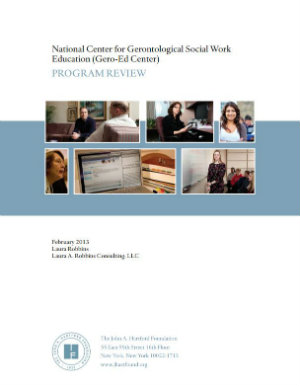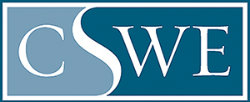 I once heard that changing curriculum in a university is like moving a cemetery. But changing curriculum to include geriatrics is exactly what the John A. Hartford Foundation has been trying to do.
I once heard that changing curriculum in a university is like moving a cemetery. But changing curriculum to include geriatrics is exactly what the John A. Hartford Foundation has been trying to do.
It seems that the National Center for Gerontological Social Work Education (Gero-Ed Center) has found the formula for success. Since 1998, the Hartford Foundation has partnered with the Council on Social Work Education (CSWE) and provided more than $13 million, to "gerontologize" accredited social work programs throughout the United States by embedding gerontological competencies into the required generalist curriculum and the overall organizational structure of social work programs.
The hard work and dedication of the project’s leaders—Nancy Hooyman (University of Washington School of Social Work), Julie Watkins (former CSWE Executive Director), and Darla Spence Coffey (current CSWE President)—has resulted in more than 1,000 faculty members participating in almost 350 curriculum and faculty development programs that have reached more than 13,000 students.
We are so proud of our partnership with CSWE that we commissioned Laura A. Robbins, a consultant, to capture the accomplishments of the Gero-Ed Center. Her report provides a great overview of the Gero-Ed Center’s history, its work, and its successes.
I’d like to share one section from Laura’s report—the story of Debra Fromm Faria—that I believe describes the impact well:
When Debra Fromm Faria began teaching undergraduate and graduate level courses in social work more than 20 years ago, she brought a passion for working with older adults that she quickly learned was shared by few of her colleagues or students.
“I always felt so alone,” she recalls. “There were maybe one or two students who wanted to work with older people. I felt isolated.”
Faria, co-director of the Center for Excellence in Gerontological Social Work and director of field education for the social work department at the College at Brockport, State University of New York, doesn’t feel alone anymore. And she credits programs funded by the John A. Hartford Foundation with helping to change the culture of social work.
Faria coordinates the MSW Graduate Certificate program in Gerontological Social Work, a program that grew out of funding from a Hartford Specialized Gerontology Program grant and incorporates at its core the Hartford Partnership Program for Aging Education (HPPAE) model.
But her partnership with the Hartford Foundation dates back to one of the first Hartford Geriatric Enrichment grants, when Brockport received $60,000 in 2002-04 to analyze curricula and set up a training program in geriatrics for faculty across three programs and two colleges (Nazareth College in Rochester, N.Y., benefitted as well.
“What we realized is that faculty didn’t have up-to-date knowledge,” Faria recalls.
 Through her involvement with the Council on Social Work Education (CSWE), Faria met Nancy Hooyman, professor in gerontology at the University of Washington who has helped guide the Gero-Rich/Gero-Ed program since its inception, and other leaders in the field.
Through her involvement with the Council on Social Work Education (CSWE), Faria met Nancy Hooyman, professor in gerontology at the University of Washington who has helped guide the Gero-Rich/Gero-Ed program since its inception, and other leaders in the field.
Faria and her colleagues continued to build on what the initial Gero-Rich grant started, meeting monthly for dinner and expanding their networking. “The Gero-Rich money profoundly impacted our curriculum in many ways,” Faria says.
Additional funding through HPPAE helped Brockport leverage other grants, including federal dollars, to develop a Center for Excellence in Gerontological Social Work as a subcontractor for the University of Rochester Medical Center.
And through the Center for Excellence, Faria and her colleagues were able to develop and implement the graduate certificate program and continue the standardized patient simulation for HPPAE students. This year, Faria had 14 students earn the graduate certificate in gerontological social work as part of their MSW.
Faria says one of the strengths of the Hartford Gerontological Social Work Initiative is that it focused on sustainability from the beginning.
“We developed some things with the Hartford money, but then we’ve continued to build on it—not only sustain it, but develop it further—through these other funding streams,” she says.
I urge you to take a few minutes to read the full report to see how far we’ve come. And I hope that, as Laura writes in her author’s note at the end of the report, the Gero-Ed Center program “can serve as encouragement and an example to those seeking to stimulate change.”
